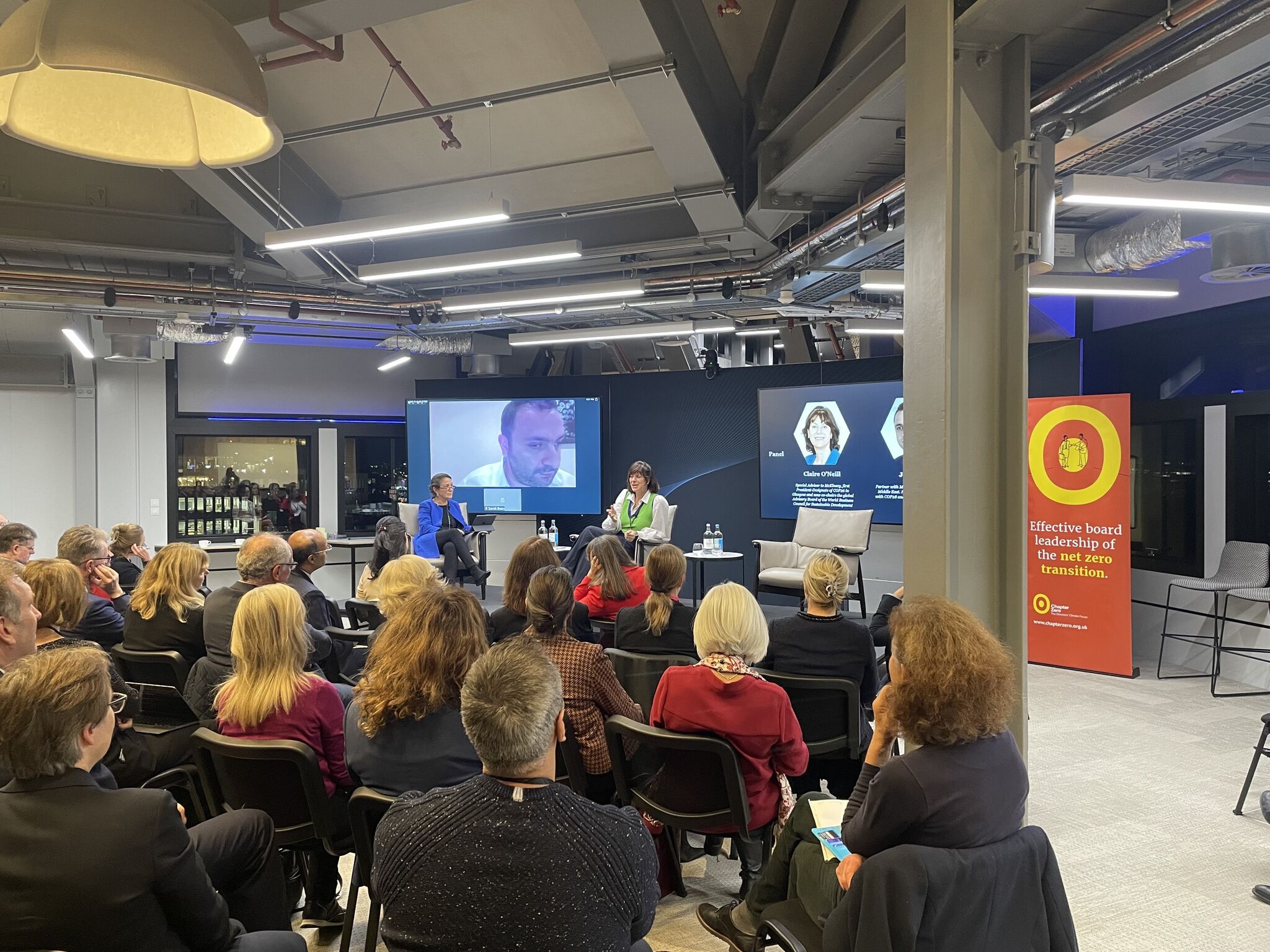
Moving boards to action
The scale of the net zero challenge
Harry Bowcott opened the session by reflecting on the scale of the net zero transition. The UN’s recent ‘Global Stocktake’, which assesses progress towards Paris Agreement targets, confirmed that while the world is making progress, this is not happening quickly enough to meet the “rapidly narrowing window” required to limit warming to 1.5 degrees.
Volatility in oil and gas markets, an increased focus on energy security, lower access to free capital, and inflation have all added complexity to the transition. Recent changes to the government’s net zero strategy underline the multiple aspects of an orderly net zero transition – public/private sector collaboration and compensating mechanisms for socioeconomic impacts.
Despite the uncertainty that is inherent in this transition, Harry emphasised three key points that remain true:
- The energy transition is about more than just decarbonisation and sustainability.
- Reaching net zero is largely not a problem of invention. Around 90% of necessary emissions reductions can be delivered through existing technologies, but only 10% of reductions will come from technologies that are proven at scale and commercially mature.
- A colossal amount of capital is required to meet climate goals – the net zero transition will likely be the largest reallocation of capital since the Second World War, and possibly ever.
The role of non-executive directors in crafting credible climate strategies
Having considered the broader climate change challenge, NEDs in attendance had the chance to discuss how climate strategy can be implemented on boards in practice. To start the discussion, Conor Kehoe provided emphasised that, rather than simply approving strategy set by their companies’ management, boards should play an active role in shaping and implementing corporate climate strategy. He went on to give examples of strategies for integrating climate change into board decision making, including:
- Establishing a ‘shadow board’ made up of employees from younger generations which could present recommendation.
- Considering registration as a B Corp and put sustainability at the heart of their corporate purpose.
- Framing climate change debates around consumer sentiment and financial opportunity, rather than engaging in moral arguments on the board.
- Creating a climate ambassador role to provide a voice for sustainability within the company.
NEDs then described their own experiences with tackling sustainability challenges on boards. Climate change is a global issue, but NEDs have been able to address it on an individual level by incorporating it into professional objectives, or even by attempting to lead a net zero personal life. Whether thinking about individual targets or broader business success, NEDs felt that a long-term outlook was vital to addressing climate change, as was integrating the issue into core strategy rather than siloing it into specific parts of the organisation.
Before joining a board, NEDs indicated that they may consider whether directors and management are committed to addressing climate change. However, it can be difficult to determine whether to avoid a board that does not appear climate-conscious, or whether to join and aim to bring sustainability to the agenda. The relationship between boards and the rest of the business is also important – meetings between directors and employees can help NEDs understand and address employees’ sustainability priorities.
NEDs also highlighted challenges that they have faced when delivering climate strategy, including a lack of carbon literacy on board, insufficient climate-related data, and focussing too much on compliance rather than opportunity.
Challenges and opportunities for addressing climate change on boards
For the final segment of this event, Susan Hooper, who sits on Chapter Zero’s board, spoke with Jo Hallas and David Nussbaum about how they have tackled climate change at board level. Even with his strong background in sustainability, David described facing unique challenges as he stepped onto the board of a large energy company. While climate change was already on the board agenda, he explained that he could ensure effective climate strategy by tying sustainability to corporate purpose. To pioneer climate action on boards, David said that NEDs should be only ‘half a step ahead’ of the rest of the board – not too far detached from directors who are not as interested in climate change.
Jo echoed many of David’s comments and contrasted her experiences addressing sustainability in executive and non-executive roles. She explained that climate change should be integrated in other issues that are already on the board’s mind – in the case of one of her businesses, this meant linking sustainability with safety. Culture varies between countries and businesses, so the optimal strategy for addressing climate change will vary depending on the board, but Jo highlighted that societal shifts have made sustainability relevant to customer demand in many businesses.
Following this panel discussion, members of the audience engaged with the panel in a Q&A session. Key points included the importance of all board members understanding climate-related metrics, tailoring advice depending on the profile of a business and its directors, and ensuring that both mitigation and adaptation form part of corporate climate strategies.
Key takeaways
- Recent developments reaffirm the importance of addressing all dimensions of the net zero transition, both social and environmental, and being able to communicate this effectively.
- Non-executive directors can accelerate the net zero transition by playing an active role in shaping corporate climate strategy, rather than just approving strategy set by executives.
- Context is important when addressing climate change at board level, the right strategy depends on both the nature of the business, and the composition of the board.
This event summary was developed in collaboration with the Centre for Climate Engagement at Hughes Hall.
You can read the session 1 summary for 'Grow or go: leading the transition' here.

Next steps
Having explored how non-executive directors can navigate the net zero transition to shape and implement credible climate strategies in the second session, the next session set the scene for COP28 and how to address key points raised, and initiatives formed, at COP28 in the boardroom. You can read the summary at the link below.
Read the session 3 summary